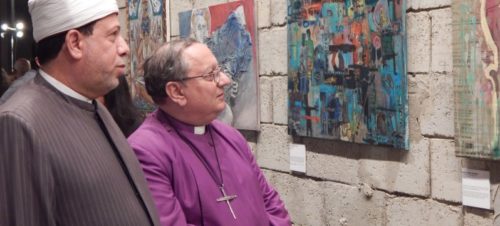In Egypt, CARAVAN art exhibition opens as a path to grassroots peacePosted Apr 10, 2015 |
|

Sheikh Abdel Aziz El Nagar of Al Azhar and Bishop Mouneer Anis attended the CARAVAN art exhibition in Cairo. Photo: Jayson Casper
[Diocese of Egypt] So much is wrong with the Arab world today, it can obscure all that is right. At the heart of both are interfaith relations, and the CARAVAN art exhibition showcases the good while addressing the bad. International in scope, its contributions stretch across continents, touching the famous and simple alike.
“We know much more about the West than the West knows about us,” said award-winning Egyptian actor Khaled el-Nabawi at the Cairo opening on April 4. “But art is sincere and can help us build bridges.”
The event was held at the upscale Westown Hub residential complex, sponsored by SODIC, a large real estate development company committed to promoting the arts for humanitarian purposes. Like them, Nabawi is one of the famous, a group often associated with the arts scene. Prior to Cairo, CARAVAN presented at the acclaimed Eglise Saint-Germain-Des-Pres in Paris, and will travel next to St. Martin-in-the-Fields, at the famous Trafalgar Square in London.
But it is the simple who are most affected by strife between the religions. And the arts often bypass them.
CARAVAN began in Cairo in 2009, seeking to promote interreligious peace and build cultural understanding. Nabawi’s words were well-chosen, for this year’s exhibition is titled The Bridge. Forty-seven premiere and emerging artists, all with connections to the Middle East, designed works specifically to highlight the unity of the peoples of the region – Muslim, Christian, Jewish, Arab, and Persian.
“There is no true conflict between religions in their essence,” said Sheikh Abdel Aziz el-Naggar of the Azhar, also appearing at the opening. “It comes from those who use religion for their domestic or international interests.”
Perhaps this is a message readily received by arts aficionados in Europe and upper-class Egypt. But what about the common man, manipulated by forces touching his faith?
“We as a church believe in dialogue,” said Bishop Mouneer Hanna Anis of the Episcopal Church in Egypt, prior to introducing his Ahzar colleague. “But especially after 9/11, there have been many efforts between men of religion that have not impacted reality as these conflicts continue.”
Something more is needed, and Anis praised CARAVAN specifically.
“We have to be creative so that dialogue reaches the people,” he said. “Paul-Gordon has done this through art, to help build harmony between cultures, and to bring people together.”
The Rev. Paul-Gordon Chandler, an Episcopal priest, is the founder of CARAVAN. An American, he grew up as a minority Christian in mostly Muslim Senegal. He was deeply influenced by the local arts scene, but also disturbed by the tensions between the two faiths.
There has to be a better way, he thought, but it was not until his years as an Episcopal priest in Cairo’s St. John’s Church that a vision began to form. So while he now tours the world highlighting the religious unity represented in Middle East artists, he desires to see something greater take hold.
“In the Middle East the public visibility of things is very important, it gives credibility to endorse at the grassroots,” he said. “It is part of acclimatizing the environment toward positive religious relations.”
High-profile public events make possible the changes at street level. Forty percent of proceeds from art sales will benefit Educate Me, an educational initiative supporting the children of an underprivileged neighborhood in Giza. Last year, $48,000 was given to projects in Egypt and Morocco.
Spin-off projects for CARAVAN are in development in Jordan and Tunisia, and a Maltese-themed initiative will soon tour every nation of the Mediterranean. Middle Eastern art emerges from the region and is taken to the West, but it also returns to spread the message at home.
And lest one think the message of interfaith harmony for the West is only given to like-minded elites, Chandler is also taking The Bridge to rural settings in the United States where misunderstanding of the Arab world is prevalent.
“Art provides a context to address the issues indirectly,” said Chandler. “Art doesn’t stop conflict, but that is not its function. It can’t change events but it can change people.”
And this, for Nabawi, is the hope for CARAVAN and other artistic endeavors in the region. “I am convinced that humanity will prevail,” he said.
“Art is the only thing that can solve what politics breaks.”
— Jayson Casper writes for Arab West Report, Christianity Today, Lapido Media, and other publications, and blogs at asenseofbelonging.org. He has previously written an article on another Anglican interfaith initiative, the Imam-Priest Exchange.

Social Menu